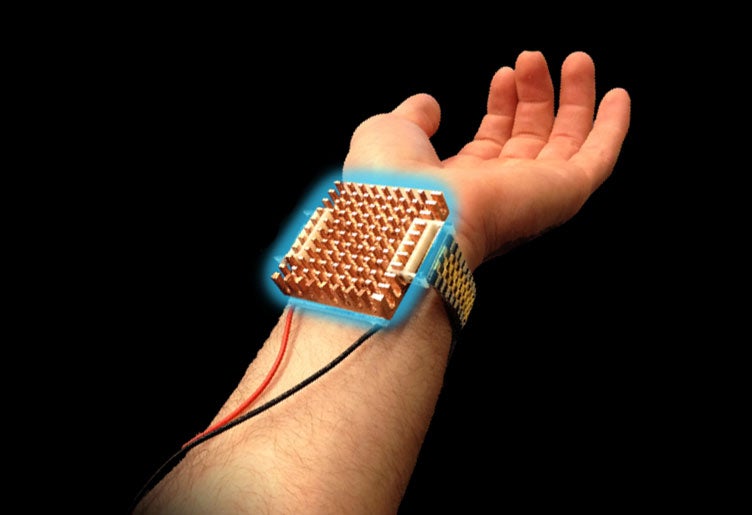Forget your jumper, this thermoelectric wristband can heat or cool your entire body
A wrist-mounted heat-sink reacts to ambient and skin temperatures, pumping out "thermal pulses" to maintain overall body temperature

Your support helps us to tell the story
From reproductive rights to climate change to Big Tech, The Independent is on the ground when the story is developing. Whether it's investigating the financials of Elon Musk's pro-Trump PAC or producing our latest documentary, 'The A Word', which shines a light on the American women fighting for reproductive rights, we know how important it is to parse out the facts from the messaging.
At such a critical moment in US history, we need reporters on the ground. Your donation allows us to keep sending journalists to speak to both sides of the story.
The Independent is trusted by Americans across the entire political spectrum. And unlike many other quality news outlets, we choose not to lock Americans out of our reporting and analysis with paywalls. We believe quality journalism should be available to everyone, paid for by those who can afford it.
Your support makes all the difference.Heating and cooling buildings is an expensive business. Recent rises in energy prices in the UK mean that the average cost of keeping our homes warm is around £610 annually (up from £360 in 2008) whilst in the US they have the opposite problem with air conditioning accounting for a massive 16.5 per cent of the country’s entire energy bill.
A team of scientists and engineers from MIT have attempted to tackle this problem by asking one simple and radical question: what if we focus on the temperature of the individual instead of the temperature of the building?
On the face of it this looks awfully similar to Energy Secretary Ed Davey’s recent advice to ‘put on a jumper’ but unsurprisingly the scientists from MIT are taking a slightly more sophisticated approach to the problem than our government is.
They’ve created a “thermoelectric bracelet” that monitors the body’s temperature and ambient conditions before sending “tailored pulses of hot or cold waveforms to the wrist to help maintain thermal comfort.”
The invention, called Wristify, is based on the fact that heating or cooling parts of the skin can help influence how hot or cold we feel over our entire body. As human beings we are not entirely accurate thermometers and spend a lot of our time simply adapting to our surroundings.
This is why a cool flannel applied to forehead of a flu sufferer can help them feel more comfortable - or why a pair of pocket handwarmers can heat up a cold hiker by themselves. How hot or cold we feel is based as much on our perception as it is on our temperature.
Wristify takes advantage of this, with the technology working via custom copper-alloy heat sink that delivers thermal pulses to the skin, powered for eight hours at a time by a lithium polymer battery.
“What we developed is a wearable, wrist-based technology that leverages human sensitivity, can detect and perfect rates of change, and can maintain overall thermal comfort while reducing the need to heat and cool buildings,” said Sam Shames, a materials science and engineering student and one of Wristify’s inventors.
Last month, in recognition of their invention, the Wristify team took home the first prize at MIT’s annual material-sciences design competition, receiving funding to take the device beyond its current prototype stage.
The team are currently exploring the idea of a commercial product for Wristify, so perhaps we can look forward to a future where instead of cranking up the thermostat on the wall, we just just dial up the heater on our wrist.
Join our commenting forum
Join thought-provoking conversations, follow other Independent readers and see their replies
Comments